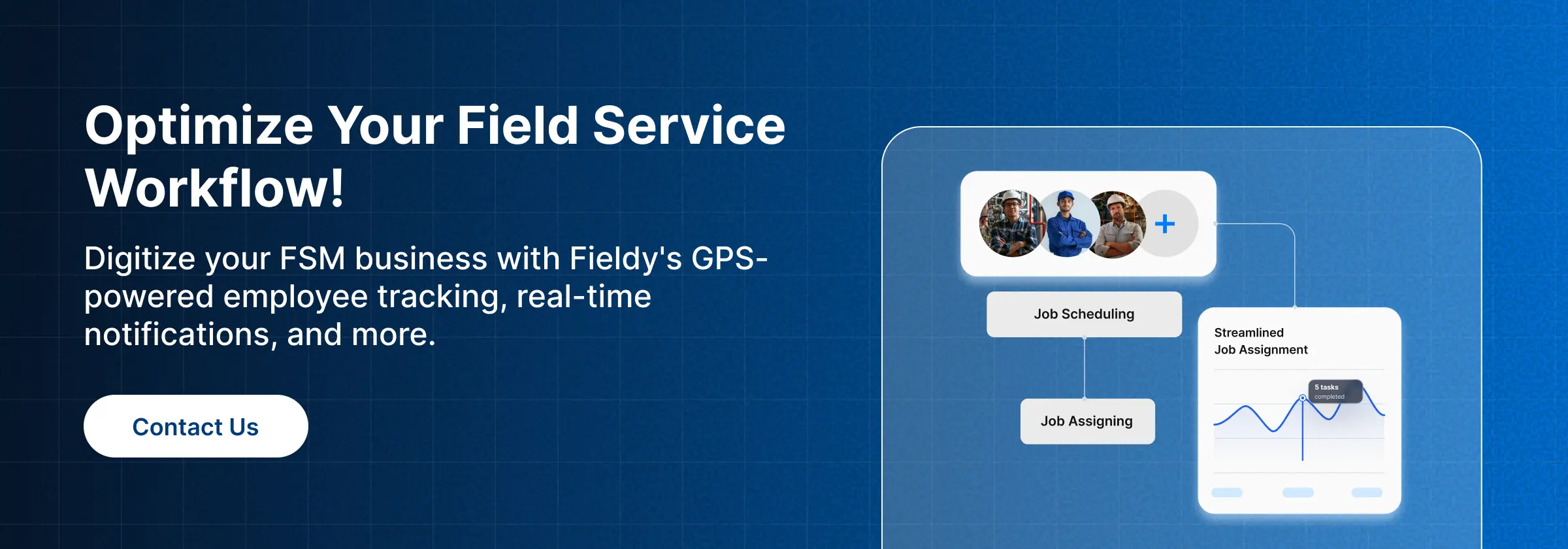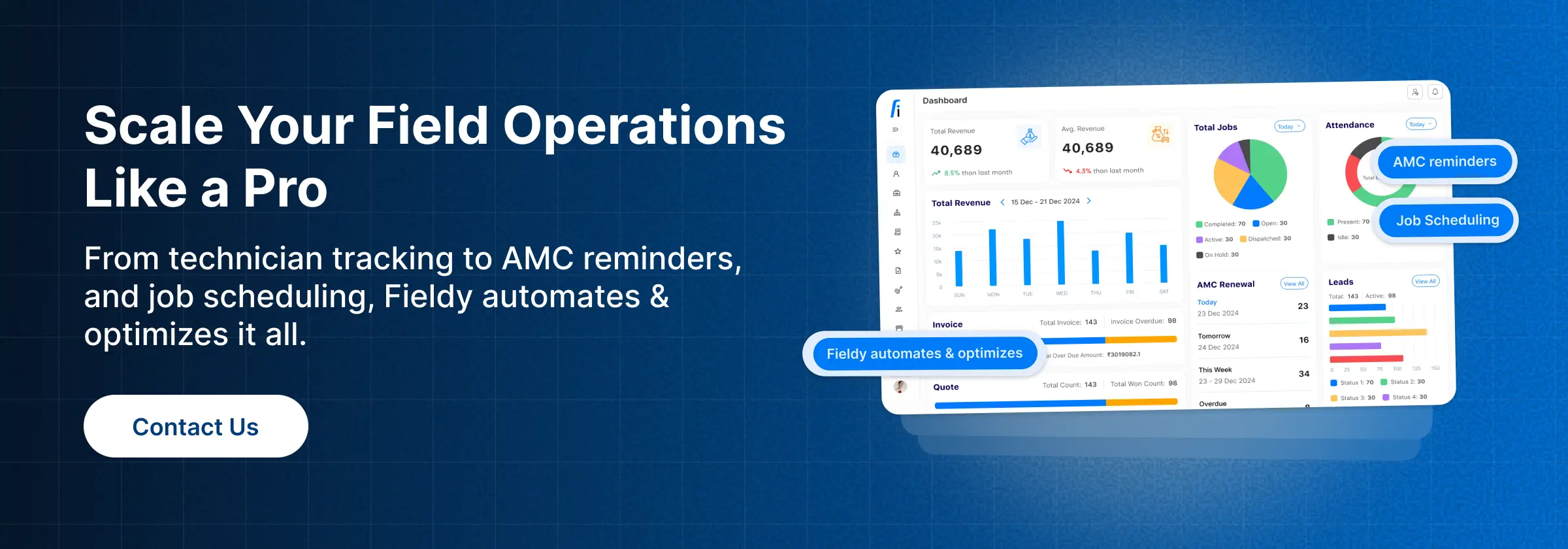Introduction 🏠✨
The 2026 home-to-improvement sector is fiercer than ever. Quality craftsmanship alone is not good enough for customers; there is also an expectation for speedy customer care, digital convenience, and transparency in communications. And field service home improvement business software fits the bill perfectly.
Home improvement businesses often struggle with poor scheduling, lost invoices, and a lack of customer visibility. PwC reports 63% of customers switch providers after just two bad experiences, something no contractor can afford to ignore.
The urgent need for technology-based service efficiency is evident. It is projected that the US home improvement industry will reach $600 billion by 2027. This guide discusses the best home improvement software for 2026, along with six of the top-ranked platforms that can help solve your problems. At the top of the list is Fieldy, designed for service-based industries, but we will also touch upon Microsoft Dynamics 365, IFS FSM, FieldPulse, Salesforce, and Zoho FSM for comparison.
Why Home Improvement Businesses Need FSM Software ⚡
Rising Customer Expectations 👨👩👧👦
Homeowners now expect Uber-like tracking and Amazon-style convenience, even from local contractors. They want real-time job updates, clear costs, and digital invoices. Field service home improvement business software applications address this through optimized scheduling, mobile enablement, and better customer interactions. Companies adopting these tools report higher satisfaction, smoother communication, and fewer delays.
Efficiency in Scheduling, Dispatching, and Invoicing 🗓️💰
Manual scheduling often causes idle time, overlaps, and costly errors. Field service home improvement business software uses intelligent dispatching to match the right technician with the right job, while automated invoicing boosts cash flow and reduces disputes. Mobile apps let technicians update jobs onsite, keeping managers and customers informed. For many, field service scheduling software has become a necessity, not a luxury, for growth.
Benefits of Home Improvement Business FSM Tools 📈
- Higher productivity through real-time task assignments.
- Improved financial accuracy with integrated billing.
- Stronger customer loyalty with digital portals and instant updates.
One study showed that field service software users report up to 23% higher revenue thanks to organized territory management and automated customer communications, a critical advantage for contractors trying to grow in a crowded market.
Challenges Home Improvement Businesses Face in 2026 ⚠️
Even though Home improvement business software adoption is rising, businesses still struggle with a few major challenges:
| 🚧 Challenge | 📋 Explanation |
|---|---|
| 👷 Labor Shortages | Skilled technicians are in high demand, making smart scheduling even more critical to ensure coverage and maintain service levels. |
| 📝 Manual Operations | Contractors relying on spreadsheets or paper experience costly errors, delays, and inefficiencies in dispatching and job tracking. |
| 💾 Data Management | With AMC contracts and long-term projects, tracking customer histories securely is becoming a compliance and record-keeping challenge. |
| 📱 Tool Fragmentation | Some businesses juggle multiple apps (CRM, invoicing, calendars) instead of a unified solution, creating workflow inefficiencies and data silos. |
| 📈 Scalability | A system that works for 5 employees may fail when the business grows to 50, highlighting the need for scalable FSM solutions. |
Industry-wide, field service management usage has been proven to decrease operational errors and improve resource allocation and project completion timelines, giving firms a much-needed competitive edge.
For many contractors, the challenge isn’t just adopting digital tools but choosing the right one from the start. Selecting the best home improvement business software upfront ensures scalability, reduces the risk of outgrowing systems too quickly, and ultimately saves both cost and time.
Best Practices When Choosing FSM Software ✅
When evaluating platforms, keep these best practices in mind:
- Define Your Business Goals 🎯
Decide if your priority is customer experience, operational efficiency, or rapid growth. This helps you pick software that aligns with your long-term vision. - Compare Pricing Models 💵
Some tools charge per user, while others use flat monthly plans. Choose the one that scales affordably with your team size. - Check Integrations 🔗
Look for compatibility with tools like QuickBooks or Zoho Books. This avoids duplicate data entry and keeps finances accurate. - Evaluate Mobile Usability 📱
Field technicians need intuitive, responsive mobile apps. A smooth app experience boosts adoption and productivity. - Prioritize Vendor Support & Compliance 🛡️
Opt for vendors with strong support and SOC 2/GDPR-ready platforms. This ensures both peace of mind and data security.
Remodeling firms that implemented platforms like Fieldy’s Home Improvement Business FSM reported a major reduction in scheduling errors and smoother project flow, thanks to features such as real-time inventory tracking and automated progress reporting.
The Best 5 (Actually 6) Home Improvement Software for 2026 🏆
1. Fieldy – Most Preferred 🌟
Key Features 🔹 : Smart scheduling, dispatching, AMC contract management, invoicing, GPS fleet tracking, QuickBooks integration.
Why It Stands Out ❓:
Fieldy goes beyond being a typical Field Service Home Improvement Business platform. It’s purpose-built for service-based industries like plumbing, HVAC, electrical, pest control, landscaping, and remodeling. Unlike many generic solutions, it provides workflows and tools tailored to field teams, which means less customization effort and faster adoption.
The platform offers flexibility that suits both independent contractors and larger franchises. For smaller businesses, Fieldy delivers affordability without sacrificing essential tools such as invoicing, AMC contract management, and GPS fleet tracking. For enterprises or multi-location franchises, it provides scalability, with advanced automation and integrations like QuickBooks that keep operations running smoothly as teams grow.
Real-World Example 🌍:
In 2023, a California-based home improvement company reported that its average invoice delay shrank from 12 days to just 48 hours after adopting Fieldy. This improvement was attributed to its automated billing workflows and seamless QuickBooks integration, which eliminated manual bottlenecks and ensured faster cash flow.
Ideal For 👀:
Businesses of all sizes that want a balanced, user-friendly, and scalable FSM solution. Whether you’re a solo contractor looking to reduce paperwork or a franchise aiming to standardize processes across multiple teams, Fieldy provides the right mix of usability, power, and affordability.
2. Microsoft Dynamics 365 🖥️
| 🔹 Feature / Highlight | 📋 Details |
|---|---|
| 🧠 Key Features | AI-driven scheduling, asset management, integration with Office 365, Teams, Azure. |
| ⭐ Why It Stands Out | Dynamics 365 delivers enterprise-grade automation and deep Microsoft ecosystem integration, ideal for large-scale operations managing thousands of service requests. |
| ✅ Pros | AI-driven optimization, seamless Microsoft integrations. |
| ❌ Cons | Expensive for SMBs, complex setup. |
| 🎯 Best For | Large enterprises already using Microsoft tools. |
| 📝 Comparison Note | Many evaluate Fieldy vs Dynamics 365 to balance enterprise scalability with cost-effectiveness. |
3. IFS Field Service Management 🏗️
| 🔹 Feature / Highlight | 📋 Details |
|---|---|
| 🧰 Key Features | Advanced asset lifecycle management, predictive analytics, compliance tracking. |
| ⭐ Why It Stands Out | IFS FSM is built for industries managing mission-critical assets, offering predictive maintenance and analytics to minimize downtime. |
| ✅ Pros | Strong asset management, predictive insights. |
| ❌ Cons | Steep learning curve, high licensing/customization costs. |
| 🎯 Best For | Enterprises handling complex assets (e.g., HVAC, energy, manufacturing). |
| 📝 Comparison Note | Contractors often review Fieldy vs IFS FSM to decide if predictive features justify higher costs. |
4. FieldPulse 📱
| 🔹 Feature / Highlight | 📋 Details |
|---|---|
| 🧰 Key Features | Mobile-first design, invoicing/estimates, scheduling, customer communications. |
| ⭐ Why It Stands Out | FieldPulse offers an affordable, technician-friendly solution with strong mobile usability, ideal for startups and small contractors. |
| ✅ Pros | Budget-friendly, mobile-first, easy invoicing. |
| ❌ Cons | Limited scalability, lacks advanced enterprise features. |
| 🎯 Best For | Small to mid-size contractors seeking simplicity and low costs. |
| 📝 Comparison Note | Fieldy vs FieldPulse often comes down to scalability: FieldPulse fits startups, while Fieldy supports long-term growth. |
5. Salesforce Field Service 🔄
| 🔹 Feature / Highlight | 📋 Details |
|---|---|
| 🧰 Key Features | AI-powered scheduling, deep CRM integration, workforce automation. |
| ⭐ Why It Stands Out | As part of the Salesforce ecosystem, this solution offers tight CRM integration and advanced AI tools to improve dispatch and customer service. |
| ✅ Pros | Strong CRM integration, AI-powered workflows. |
| ❌ Cons | High costs, requires skilled admins. |
| 🎯 Best For | Businesses already invested in Salesforce CRM. |
| 📝 Comparison Note | Companies compare Fieldy vs Salesforce FSM to see whether deep CRM functionality outweighs Fieldy’s broader affordability. |
6. Zoho FSM 🟠
| 🔹 Feature / Highlight | 📋 Details |
|---|---|
| 🧰 Key Features | Scheduling, invoicing, AMC management, integration with Zoho CRM, Books, Projects. |
| ⭐ Why It Stands Out | Zoho FSM is a lightweight and affordable option that connects well with other Zoho apps, ideal for freelancers and small teams. |
| ✅ Pros | Affordable, strong Zoho ecosystem integration. |
| ❌ Cons | Limited advanced features, not ideal for larger businesses. |
| 🎯 Best For | Independent contractors and small teams. |
| 📝 Comparison Note | Fieldy vs Zoho FSM is a common choice for contractors weighing scalability vs affordability. |
Benefits of Using FSM Software for Home Improvement in 2026 🌟
- Operational Efficiency ⚡: FSM software automates scheduling and routes, cutting travel time and boosting daily job completions.
- Customer Experience 🤝: Real-time updates, digital estimates, and portals from FSM software build trust and professionalism.
- Financial Accuracy 💰: FSM software ties invoicing to job completion, reducing errors and improving cash flow.
- Scalability 📈: Supports growth with centralized dashboards, multi-location control, and performance analytics.
- Data Security 🔒: SOC 2-certified FSM software encrypts data, ensuring compliance and customer trust.
Industry-Wide Impact 📝
FSM software delivers faster completions, higher fix rates, and stronger close rates, making it a must-have for 2026.
Conclusion ✅
The right FSM platform can transform how contractors handle operations, customer engagement, and financials. While there are several contenders in the market, Fieldy continues to lead as the best home improvement software in 2026 due to its industry-focused design, scalability, and ease of use.
That said, Microsoft Dynamics, IFS FSM, Salesforce, FieldPulse, and Zoho FSM all serve important niches depending on your business size and ecosystem. Whether you’re a solo contractor or a national home improvement chain, adopting the best home improvement business software ensures you stay competitive in 2026 and beyond.
FAQs❓
What is field service home improvement software?
It’s a digital platform that helps contractors manage scheduling, dispatching, invoicing, and customer communication efficiently.
Which software is best for small home improvement businesses?
Fieldy and Zoho FSM are budget-friendly, while FieldPulse is great for SMBs that prioritize mobility and affordability.
What is the best home improvement software in 2025?
The best home improvement software in 2025 is Fieldy, thanks to its balance of affordability, scalability, and industry-specific features like AMC contract management, smart scheduling, and QuickBooks integration.




